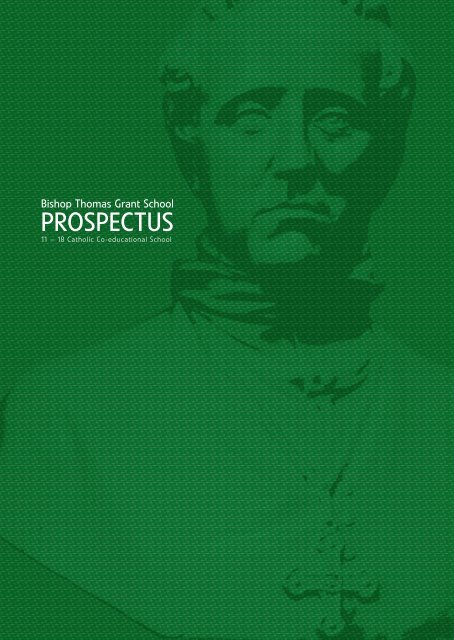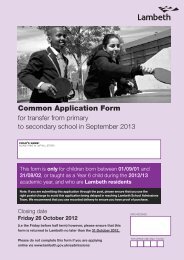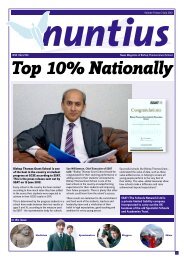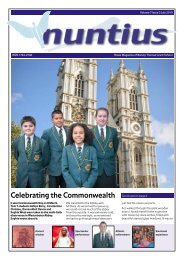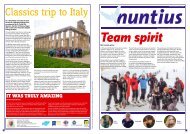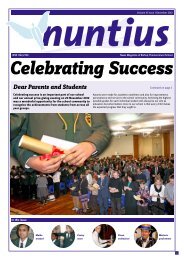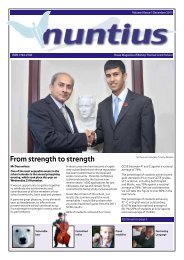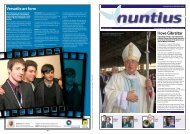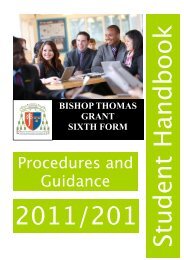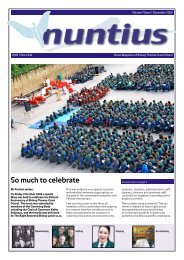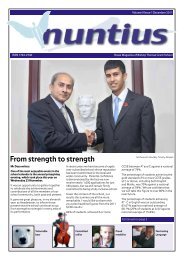PROSPECTUS - Bishop Thomas Grant School
PROSPECTUS - Bishop Thomas Grant School
PROSPECTUS - Bishop Thomas Grant School
You also want an ePaper? Increase the reach of your titles
YUMPU automatically turns print PDFs into web optimized ePapers that Google loves.
<strong>Bishop</strong> <strong>Thomas</strong> <strong>Grant</strong> <strong>School</strong><br />
<strong>PROSPECTUS</strong><br />
11 – 18 Catholic Co - educational <strong>School</strong>
Welcome to BISHOP THOMAS GRANT SCHOOL<br />
I am delighted to introduce you to <strong>Bishop</strong> <strong>Thomas</strong> <strong>Grant</strong> <strong>School</strong> which<br />
was established in 1959 and which was the first comprehensive school<br />
in the Archdiocese of Southwark to serve the Catholic population of<br />
South London.<br />
The <strong>School</strong> Mission statement contained in this<br />
prospectus makes clear the school’s distinctive<br />
character and purpose. The school is conscious<br />
of its mission as a Catholic school serving a<br />
multi-ethnic society and of the vital importance<br />
of the home-parish-school partnership. It is this<br />
partnership that provides the strong foundation<br />
on which to build excellence and nurture the<br />
faith of young people.<br />
<strong>Bishop</strong> <strong>Thomas</strong> <strong>Grant</strong> has high expectations<br />
for its students and demands high standards<br />
of work and behaviour. Our Code of Conduct<br />
states what is expected of each student.<br />
Conduct is based on the Christian values of<br />
courtesy, service and unselfishness both inside<br />
and outside school and students are expected<br />
to reflect these standards in their daily routine,<br />
their uniform and personal appearance.<br />
Regardless of ability, all students are encouraged<br />
to work hard to develop their potential and<br />
make use of their strengths and abilities. We<br />
use a variety of rewards to celebrate students’<br />
successes as we believe strongly that they learn<br />
when they feel valued and their achievements<br />
are recognised.<br />
Learning is a privilege and a right. The school<br />
community will therefore not tolerate any<br />
behaviour which disrupts students’ learning.<br />
<strong>Bishop</strong> <strong>Thomas</strong> <strong>Grant</strong> <strong>School</strong> occupies an<br />
enviable position and enjoys attractive and<br />
extensive views over much of South West<br />
London. The school has benefited from major<br />
refurbishment and renovation over the last<br />
few years and now boasts excellent facilities<br />
and resources.<br />
The school takes every opportunity to ensure<br />
that all subjects are taught by qualified teachers<br />
trained in the subject in which they teach. The<br />
teaching staff are conscientious and experienced<br />
and work with the students to create a friendly<br />
and supportive atmosphere.<br />
After our last Ofsted inspection, we were<br />
extremely proud to receive an excellent report.<br />
At the back of this prospectus you can read<br />
for yourself unedited quotes taken from this,<br />
written by the inspection team. This prospectus<br />
outlines what <strong>Bishop</strong> <strong>Thomas</strong> <strong>Grant</strong> <strong>School</strong><br />
offers for your child. I hope that it is of help<br />
to you at this most important stage of your<br />
child’s education.<br />
I am inviting you to come to visit us, especially<br />
during the day when you will be able to see the<br />
school at work. You will meet our students and<br />
see our strengths for yourselves.<br />
I would be delighted to meet with you.<br />
Louis Desa BSc Headmaster<br />
BISHOP THOMAS GRANT SCHOOL BISHOP THOMAS GRANT SCHOOL BISHOP THOMAS GRANT SCHOOL BISHOP THOMAS GRANT SCHOOL BISHOP THOMAS GRANT SCHOOL
BISHOP THOMAS GRANT SCHOOL BISHOP THOMAS GRANT SCHOOL BISHOP THOMAS GRANT SCHOOL BISHOP THOMAS GRANT SCHOOL BISHOP THOMAS GRANT SCHOOL<br />
LOWER SCHOOL CURRICULUM<br />
National Curriculum At Key Stage 3<br />
Every student follows a common curriculum comprising:<br />
Religious Education<br />
English<br />
Mathematics<br />
Science<br />
Physical Education<br />
History<br />
Geography<br />
Citizenship/ Personal, Health and Social Education<br />
Drama<br />
Music<br />
Art<br />
Design and Technology<br />
Modern Foreign Languages : French, German, Mandarin Chinese, Spanish. Also Latin.<br />
Information and Communications Technology<br />
In addition to timetabled music lessons, students<br />
have the opportunity to receive individual tuition on<br />
a variety of instruments.<br />
On entry to the school students are placed in two<br />
parallel populations which are then set according<br />
to ability. The decision as to which set students are<br />
placed in is based on their primary school records,<br />
their key Stage 2 SATs results and the Cognitive<br />
Ability Tests (CATs) which they sit at <strong>Bishop</strong> <strong>Thomas</strong><br />
<strong>Grant</strong> <strong>School</strong> in May. Students are taught in ability<br />
sets for Religious Education, English, Mathematics,<br />
Science, History, Geography, ICT and Citizenship/<br />
PHSE. They are taught Art, Drama, Modern Foreign<br />
Languages, Music, PE and Technology in mixed<br />
ability sets.<br />
We continuously monitor students’ progress and<br />
review their set placements on a half-termly basis.<br />
Parents and guardians are informed formally<br />
about changes.<br />
BISHOP THOMAS GRANT SCHOOL BISHOP THOMAS GRANT SCHOOL BISHOP THOMAS GRANT SCHOOL BISHOP THOMAS GRANT SCHOOL BISHOP THOMAS GRANT SCHOOL
BISHOP THOMAS GRANT SCHOOL BISHOP THOMAS GRANT SCHOOL BISHOP THOMAS GRANT SCHOOL BISHOP THOMAS GRANT SCHOOL BISHOP THOMAS GRANT SCHOOL<br />
UPPER SCHOOL CURRICULUM<br />
National Curriculum At Key Stage 4<br />
CORE CURRICULUM COMPULSORY SUBJECTS<br />
Religious Studies<br />
English Language<br />
English Literature<br />
GCSE Science<br />
Mathematics<br />
GCSE ICT (Single) Non Option-Core<br />
PE (non examination)<br />
Citizenship/PHSE (non examination)<br />
COMPULSORY AREAS OF LEARNING<br />
Work-related Learning<br />
Careers Education<br />
Sex and Relationship Education<br />
(These are not separate subjects. The ‘areas of learning’ are<br />
taught throughout the curriculum, within other subjects.)<br />
OPTIONAL SUBJECTS (ENTITLEMENT AREAS)<br />
Additional Science Award<br />
Art and Design<br />
BTEC First Diploma in Business<br />
BTEC First Diploma For ICT Practitioners<br />
BTEC First Diploma in Travel and Tourism<br />
Computing<br />
Drama<br />
Economics and Business<br />
French<br />
GCSE PE and Sport<br />
German<br />
Geography<br />
Graphic Products<br />
History<br />
Media Studies<br />
Music<br />
Product Design<br />
Resistant Materials<br />
Spanish<br />
Textiles Technology<br />
Triple Science (Biology, Chemistry, Physics)<br />
Students can choose five optional subjects. At <strong>Bishop</strong><br />
<strong>Thomas</strong> <strong>Grant</strong> <strong>School</strong> we place particular importance<br />
on ensuring that Year 9 students and their parents or<br />
guardians make fully informed subject choices at<br />
Key Stage 4.<br />
At the end of the Spring Term each year we produce a<br />
detailed Options Booklet. We hold an Options Evening<br />
and an Options Day during which the content of the<br />
Booklet is explained and opportunities are given to<br />
liaise directly with the head of each department as<br />
well as with careers advisors from Connexions and<br />
representatives from post-16 institutions.<br />
Using Key Stage 3 SATs results together with Teacher<br />
Assessment levels and CATs (Cognitive Ability Tests)<br />
scores, we ensure that students and their parents<br />
or guardians choose the most appropriate subjects<br />
which match students’ innate abilities and aspirations,<br />
enabling them to achieve their full potential.<br />
BISHOP THOMAS GRANT SCHOOL BISHOP THOMAS GRANT SCHOOL BISHOP THOMAS GRANT SCHOOL BISHOP THOMAS GRANT SCHOOL BISHOP THOMAS GRANT SCHOOL
BISHOP THOMAS GRANT SCHOOL BISHOP THOMAS GRANT SCHOOL BISHOP THOMAS GRANT SCHOOL BISHOP THOMAS GRANT SCHOOL BISHOP THOMAS GRANT SCHOOL<br />
Religious Education<br />
At <strong>Bishop</strong> <strong>Thomas</strong> <strong>Grant</strong> <strong>School</strong>, we recognise that<br />
it is the task of the Catholic school, in partnership<br />
with both home and parish, to continue to present<br />
the vision of Christ and the message of the Gospel as<br />
relevant to Christians in today’s world. Consequently,<br />
we provide a broad and balanced curriculum which<br />
includes a study of scripture, Church teaching, moral<br />
values and an insight into other faiths. Religious<br />
Education is seen as the cornerstone of the curriculum<br />
and as such ten percent curriculum time is devoted to<br />
it in every year group.<br />
Pastoral Care<br />
At <strong>Bishop</strong> <strong>Thomas</strong> <strong>Grant</strong> <strong>School</strong> we make no<br />
distinction between the academic, pastoral or spiritual<br />
development of our students. Our aim is to see the<br />
total person and provide a strong, invisible yet tangible<br />
network of support and guidance. We recognise<br />
that a well-founded pastoral system provides a solid<br />
framework where students feel safe and are able<br />
to learn.<br />
Our pastoral system encourages self-discipline, high<br />
expectations, respect for self and for others.<br />
Students are placed in forms with a tutor who becomes<br />
their mentor and who gains a good knowledge of<br />
each individual’s potential through the data we have<br />
available. An experienced teacher is given responsibility<br />
for a whole year group as a Head of Year and is able to<br />
monitor pastoral and academic progress.<br />
All staff are aware of their responsibility for the<br />
behaviour management policy at the school. Students<br />
are aware of the high standards set for behaviour and<br />
respect. All students are encouraged to participate in<br />
the school’s reward systems.<br />
We aim to create a calm learning environment in<br />
which all students are able to gain knowledge and<br />
understanding of themselves, their gifts, their talents<br />
and what they can offer the community in which<br />
they live and work. This is achieved in an atmosphere<br />
permeated with Gospel values and through a<br />
programme of study which meets the demands of<br />
current legislation.<br />
BISHOP THOMAS GRANT SCHOOL BISHOP THOMAS GRANT SCHOOL BISHOP THOMAS GRANT SCHOOL BISHOP THOMAS GRANT SCHOOL BISHOP THOMAS GRANT SCHOOL
At <strong>Bishop</strong> <strong>Thomas</strong> <strong>Grant</strong> <strong>School</strong>, we recognise<br />
that it is the task of the Catholic school, in<br />
partnership with both home and parish, to<br />
continue to present the vision of Christ and the<br />
message of the Gospel as relevant to Christians<br />
in today’s world.
BISHOP THOMAS GRANT SCHOOL BISHOP THOMAS GRANT SCHOOL BISHOP THOMAS GRANT SCHOOL BISHOP THOMAS GRANT SCHOOL BISHOP THOMAS GRANT SCHOOL<br />
Citizenship and PHSE<br />
Our Citizenship/PHSE (Personal, Health and Social<br />
Education) programme, which is taught throughout<br />
the curriculum, is designed to offer a wide range<br />
of opportunities for all students to explore issues<br />
relating to everyday life and experiences. We hope<br />
that as a result they will become more aware of what<br />
is expected of them as members of a family, school,<br />
local, national and global community.<br />
Child Protection<br />
The school operates a robust Child Protection policy<br />
which uses procedures which have been agreed by<br />
the Local Authority and which is fully supported by<br />
the governing body and the staff. Copies of this are<br />
available from the school secretary.<br />
English<br />
The English Department provides a broad and varied<br />
curriculum for all students at both Key Stage 3 and Key<br />
Stage 4. We seek to imbue our students with a love<br />
of literature and language and to tap their creative<br />
potential and of course, crucially, to prepare them for<br />
their examinations at the end of Key Stage 3 and their<br />
GCSE and A level examinations.<br />
We aim to develop students’ skills in Speaking and<br />
Listening and Reading and Writing, drawing upon<br />
prose, poetry and drama as well as media texts and<br />
ICT. Both literary and non-literary texts are used to<br />
stimulate students to read with understanding and<br />
for pleasure. We endeavour to strike the right balance<br />
between literary and aesthetic concerns on the one<br />
hand and literacy and the development of transferable<br />
skills and cross-curricular learning on the other.<br />
Students are actively encouraged to express their<br />
opinions and feelings through group discussion and<br />
debate as well as through discursive writing and are<br />
taught to develop their critical awareness, the English<br />
classroom being a forum for shared learning.<br />
A crucial aspect of our work in English revolves around<br />
Assessing Pupils’ Progress (APP) which provides a<br />
structured approach to assessing English so teachers<br />
can track students’ progress in Reading and Writing<br />
through Key Stage 3 and use diagnostic information<br />
about students’ strengths and weaknesses. At<br />
regular intervals students are given specific writing<br />
assessment tasks, the results reviewed and a profile<br />
built up of each student’s attainment. This is then used<br />
to inform whole school tracking targets in relation to<br />
each student.<br />
The department is well resourced with books and<br />
computers and students are encouraged to use<br />
BISHOP THOMAS GRANT SCHOOL BISHOP THOMAS GRANT SCHOOL BISHOP THOMAS GRANT SCHOOL BISHOP THOMAS GRANT SCHOOL BISHOP THOMAS GRANT SCHOOL
BISHOP THOMAS GRANT SCHOOL BISHOP THOMAS GRANT SCHOOL BISHOP THOMAS GRANT SCHOOL BISHOP THOMAS GRANT SCHOOL BISHOP THOMAS GRANT SCHOOL<br />
subject specific software including word processing<br />
programmes. Materials are carefully selected to ensure<br />
equality of opportunity for all.<br />
The English Department is well resourced with its own<br />
suite of modern, spacious, carpeted rooms, office and<br />
stock-room, and computers are readily accessible for<br />
ICT work. The Department plays an active role in the<br />
extracurricular life of the school, participating in such<br />
national events as the Readathon and the Carnegie Book<br />
Competition as well as National Poetry Day and World<br />
Book Day. Theatre in Education groups come into the<br />
school regularly to work with students, for example in<br />
relation to their Shakespeare SAT course, and colleagues<br />
organise trips to West End theatres. An English Club<br />
meets weekly as a forum for such events as well as<br />
promoting creative writing and debate. In these ways<br />
the English Department plays a crucial role in raising<br />
the profile of English in the school as well as fostering<br />
the creative and intellectual talents of our students,<br />
empowering them for their future lives and careers.<br />
English as an Additional Language<br />
Our school is a polyglot environment where over<br />
forty different languages are spoken. The needs of<br />
students for whom English is an additional language<br />
are catered for by a well equipped EAL department.<br />
An experienced staff backed by bilingual assistants<br />
supports the students within the classroom, with<br />
withdrawal teaching being made available to those<br />
students who are in the early stages of learning<br />
English. EAL students in Years 10 and 11 who are<br />
considered to be borderline in GCSE English will be<br />
identified and targeted, with support provided by<br />
the EAL Department.<br />
Students who choose to have six science lessons a<br />
week study the AQA Science A and AQA Additional<br />
Science courses. These well-respected courses taught<br />
by specialist subject teachers provide students with<br />
a sound scientific foundation. Both courses cover<br />
biology, chemistry and physics topics.<br />
Students who choose to have nine science lessons a<br />
week study the AQA Biology, AQA Chemistry and AQA<br />
Physics courses. These well-respected courses taught<br />
by specialist subject teachers provide students with an<br />
in-depth knowledge of the three separate sciences.<br />
Through investigative tasks students develop critical<br />
thinking skills and the confidence to engage in the<br />
relevance of science in their everyday lives.<br />
Students are set in groups according to their ability<br />
and achievement. Using a variety of teaching, learning<br />
and assessment methods, students are continually<br />
encouraged to strive for excellence. We use a wide<br />
range of teaching methods and differentiated schemes<br />
of work. This ensures that we cater to students’<br />
differing learning styles and that we meet the needs<br />
of each individual.<br />
Science<br />
Science is a core subject studied by all students in<br />
Years 7 to 11. At Key Stage 3 students study a range<br />
of biology, chemistry and physics topics as well as<br />
learning how to work safely and sensibly in a<br />
science laboratory.<br />
At Key Stage 4 students choose what to study from<br />
a wide range of different courses. Students who opt<br />
to have three science lessons a week study the OCR<br />
National Award course which is a portfolio-based Level<br />
2 qualification with no external examinations. Students<br />
who are successful on this course gain the equivalent<br />
of two GCSE Science qualifications.<br />
BISHOP THOMAS GRANT SCHOOL BISHOP THOMAS GRANT SCHOOL BISHOP THOMAS GRANT SCHOOL BISHOP THOMAS GRANT SCHOOL BISHOP THOMAS GRANT SCHOOL
BISHOP THOMAS GRANT SCHOOL BISHOP THOMAS GRANT SCHOOL BISHOP THOMAS GRANT SCHOOL BISHOP THOMAS GRANT SCHOOL BISHOP THOMAS GRANT SCHOOL<br />
Mathematics<br />
Mathematics is a core subject of the National<br />
Curriculum studied by all students for just over ten<br />
percent of the week. Students are taught in setted<br />
classes in order that they can proceed at a pace<br />
suitable for their mathematical aptitude. Progress is<br />
carefully monitored by continuous assessment and by<br />
students’ self-assessment. There is formal testing at<br />
half-termly intervals.<br />
Students follow structured schemes of work which<br />
develop their knowledge, skills and understanding<br />
in the following areas: Numbers and Algebra,<br />
Shape and Space, Handling Data and Using and<br />
Applying Mathematics.<br />
The schemes of work contain special materials which<br />
provide help for those experiencing difficulties, but<br />
which also contain extended work for the more able.<br />
All students are entered for the final exam according<br />
to their mathematical ability. Foundation (Grades C-G)<br />
or Higher (Grades A*-D).<br />
At Key Stage 4, the more able students will be fast<br />
tracked to take their GCSE or Statistics at the end<br />
of Year 10 and to embark on an Additional Maths<br />
course in year 11.<br />
Information and Communications<br />
Technology<br />
Students in Year 7 follow the new Key Stage 3 strategy<br />
recommended by the Department for Education and<br />
Skills which is mapped across in the online book they<br />
use called ICT 4 Life. This gives them a thorough<br />
grounding in the use of ICT. In Year 8, students<br />
prepare for the DiDA (Diploma in Digital Applications)<br />
which gives them the skills required to tackle the SPB<br />
(Summative Project Brief) which is assessed in Year<br />
9 using an online book called DiDA: Using ICT. This<br />
accelerated curriculum (starting DiDA in Year 9) allows<br />
students of all abilities to reach their full potential by<br />
the end of Year 11.<br />
DiDA is the new suite of qualifications run at the<br />
school. This allows students to gain one, two,<br />
three or four GCSE equivalents in various areas of<br />
ICT specialism such as Multimedia, Graphics and<br />
Enterprise. The assessment of the course is based<br />
completely on an SPB for each unit. Students complete<br />
an e-portfolio in response to the SPB which is<br />
published by the examination board.<br />
In year 10 we offer a wide selection of ICT courses<br />
tailored to suit the individual student. At the end of<br />
BISHOP THOMAS GRANT SCHOOL BISHOP THOMAS GRANT SCHOOL BISHOP THOMAS GRANT SCHOOL BISHOP THOMAS GRANT SCHOOL BISHOP THOMAS GRANT SCHOOL
Through investigative tasks students develop<br />
critical thinking skills and the confidence to<br />
engage in the relevance of science in their<br />
everyday lives.
BISHOP THOMAS GRANT SCHOOL BISHOP THOMAS GRANT SCHOOL BISHOP THOMAS GRANT SCHOOL BISHOP THOMAS GRANT SCHOOL BISHOP THOMAS GRANT SCHOOL<br />
Year 9 students who do not choose ICT as an option<br />
will either continue with the DiDA qualification, or will<br />
be selected to do the IGCSE in ICT. Students choosing<br />
ICT as an option could also continue doing the<br />
DiDA qualification, or start BTEC First in ICT, GCSE in<br />
Computing or GCSE ICT.<br />
In our sixth form we offer the GCE ICT A level course,<br />
GCE Computing course, and the BTEC National ICT,<br />
again giving students a wide selection in order to<br />
map their skills already developed at Key Stage 4 to a<br />
higher level course in ICT.<br />
ICT across the school<br />
ICT is a core subject in the school curriculum at Key<br />
Stages 3 and 4, and as well as the excellent ICT<br />
department, the use of ICT across the whole school<br />
is a feature of our provision. In addition to providing<br />
high quality teaching of ICT as a school subject we<br />
are using it to raise attainment in all subjects, increase<br />
inclusion, increase student motivation, bridge the<br />
‘digital divide’ and reduce the administrative<br />
burden on teachers.<br />
The school infrastructure was completely refurbished<br />
in summer 2005 under the Lambeth Connected<br />
Learning Project and all equipment was refreshed in<br />
2009. This provided state-of-the-art ICT resources that<br />
support learning, teaching and school administration<br />
under a service managed by the biggest supplier<br />
of ICT to schools. All students learn to use the latest<br />
software and hardware for finding things out,<br />
developing ideas and making things happen.<br />
We have eight fully equipped ICT suites which may<br />
be booked by departments for work during which<br />
individual students need their own computers. These<br />
rooms all have black and white and colour printers,<br />
scanners and interactive whiteboards for multimedia<br />
presentations. We also have specialist ICT provision in<br />
English as an Additional Language, Special Educational<br />
Needs, Design and Technology, Art and Music.<br />
Students across the school have access to wireless<br />
laptop computers as well as to open access computers<br />
in the Learning Support Unit. All teachers have their<br />
own laptop computer and most teaching rooms are<br />
equipped with data projectors.<br />
BISHOP THOMAS GRANT SCHOOL BISHOP THOMAS GRANT SCHOOL BISHOP THOMAS GRANT SCHOOL BISHOP THOMAS GRANT SCHOOL BISHOP THOMAS GRANT SCHOOL
BISHOP THOMAS GRANT SCHOOL BISHOP THOMAS GRANT SCHOOL BISHOP THOMAS GRANT SCHOOL BISHOP THOMAS GRANT SCHOOL BISHOP THOMAS GRANT SCHOOL<br />
Economics and Business<br />
In an increasingly competitive jobs market, the<br />
demand for young people to possess enterprise and<br />
business skills is strong. We offer a wide range of<br />
opportunities for our students to develop these skills<br />
and equip themselves with everything they need to<br />
succeed in their future careers.<br />
Opportunities to experience and get involved with<br />
enterprise activities start from Year 7 with extracurricular<br />
events such as personal finance workshops<br />
and charity fundraising projects. On commencing Year<br />
10, students are offered the choice to formally study a<br />
vocational BTEC business course or an academic GCSE<br />
in economics.<br />
In both cases, lessons are engaging and motivational,<br />
inviting students to think about the businesses and<br />
economic events with which they are familiar.<br />
A variety of learning methods are used, including<br />
presentations, role-plays, MP3s, interviews and<br />
computer-based work. High-ability students are<br />
pushed with more demanding tasks, and weaker<br />
students are aided with structured support.<br />
The choice of subjects available increases even further<br />
in the sixth form, with academic A levels in Economics,<br />
Business and Accounting as well as a vocational<br />
BTEC National in Business. Whatever the interests<br />
and talents of your child, we have the right course,<br />
experience and support for them to achieve success.<br />
Geography<br />
All students are taught Geography at Key Stage 3.<br />
They learn a broad and balanced range of human<br />
and physical geography which stimulates an interest<br />
and a sense of wonder about places. It helps young<br />
people make sense of a complex and dynamically<br />
changing world. It explains where places are, how<br />
places and landscapes are formed, how people<br />
and their environment interact, and how a diverse<br />
range of economies, societies and environments are<br />
interconnected. It builds on students’ own experiences<br />
to investigate places at all scales, from the personal to<br />
the global.<br />
The Geography National Curriculum at <strong>Bishop</strong> <strong>Thomas</strong><br />
<strong>Grant</strong> <strong>School</strong> gives a stronger than ever focus on<br />
sustainable development and environmental change.<br />
Units such as Coastal Processes, Tectonic Activity,<br />
Development and Energy deepen students’<br />
understanding of the formation of the world around<br />
them and the responsibility they have as global<br />
citizens. Students who choose GCSE Geography<br />
follow a course which builds on this human/physical<br />
theme, further extending their understanding of the<br />
relationships between people and their environment.<br />
GCSE Geography Controlled Assessment is worth<br />
twenty-five percent of the overall qualification, and<br />
takes the form of a study based on a task set yearly<br />
by the AQA (Spec A) Exam Board. This task completion<br />
involves fieldwork and the writing up of the data<br />
collected under a variety of limited and high controls.<br />
A good geographer is someone who is able to<br />
examine evidence, interpret a variety of information<br />
and make informed predictions.<br />
Students inspired to continue studying Geography find<br />
the A Level course exciting, useful - and fun.<br />
History<br />
The Key Stage 3 course is based around six main<br />
themes – Everyday Life, Empires, Movement and<br />
Settlement, England, Power and Democracy and<br />
Conflict and Cooperation.<br />
Through these topics students develop their<br />
conceptual understanding of chronology, change and<br />
continuity, diversity, significance and interpretation,<br />
and causes and consequences.<br />
The aim of History is that by the end of KS3 students<br />
are able to tell the ‘big stories’ over time and therefore<br />
make sense of the world we live in. For example, by<br />
the end of Year 7 students should be able to tell the<br />
big story of how everyday life has changed over the<br />
past thousand years and what caused the changes<br />
– the Black Death, the Dissolution of the Monasteries<br />
and the Industrial Revolution. By the end of Year<br />
8 students should be able to tell the story of the<br />
development of political power including the changing<br />
relationship between crown and parliament.<br />
For GCSE the department is currently changing from<br />
the Edexcel SHP syllabus, to OCR Modern World<br />
History. Year 11 students study Medicine through Time<br />
and Surgery as a development study. Year 10 will<br />
study International Relations from 1919-39 and a depth<br />
study on Weimar and Nazi Germany. The controlled<br />
assessment topics are based around protest in the USA<br />
from 1945-1970.<br />
BISHOP THOMAS GRANT SCHOOL BISHOP THOMAS GRANT SCHOOL BISHOP THOMAS GRANT SCHOOL BISHOP THOMAS GRANT SCHOOL BISHOP THOMAS GRANT SCHOOL
BISHOP THOMAS GRANT SCHOOL BISHOP THOMAS GRANT SCHOOL BISHOP THOMAS GRANT SCHOOL BISHOP THOMAS GRANT SCHOOL BISHOP THOMAS GRANT SCHOOL<br />
Students are set in ability groups with progress<br />
monitored carefully. We make good use of the ICT<br />
facilities, and there are an increasing number of<br />
enrichment activities across all year groups.<br />
The department follows the Edexcel A level course,<br />
with a British study of Tudor England 1536-88<br />
starting in Year 12 and continuing into Year 13. For<br />
the European paper the students study Tsarist and<br />
Communist Russia in Year 12, and for the coursework<br />
in Year 13 they write two essays on different elements<br />
of the Golden Age of Spain 1474-1598<br />
Media Studies<br />
Media Studies at GCSE offers extensive and meaningful<br />
coverage of media theory and practice and practical<br />
work which integrates theories and concepts. It<br />
provides opportunities to learn about real media<br />
products and industries and the chance to study<br />
across a range of different media.<br />
Students will learn to develop a critical understanding<br />
of the impact of mass media and its technologies on<br />
contemporary society. They will gain an understanding<br />
of the key concepts of Media Language, Research<br />
and Planning, Media Institutions and Audience<br />
Representation.<br />
Media Studies will give students a great head start<br />
for a career in the exciting, innovative and competitive<br />
entertainment and media industries.<br />
The subject provides opportunities to think critically and<br />
imaginatively about media, and can open up a world of<br />
opportunities in publishing, journalism, film, television,<br />
radio and music.<br />
It is also a wonderful enhancement to any<br />
communication, public relations, people-orientated<br />
professions and any technology industry.<br />
Modern Foreign Languages<br />
The importance of being able to speak a foreign<br />
language has never been greater. International<br />
business and travel are part of everyday life and as a<br />
result linguists are in great demand.<br />
We aim to respond to this need. In Year 7, students<br />
choose from French, German or Spanish. They<br />
may continue this language up to GCSE level. The<br />
department boasts many native speakers and<br />
specialist linguists. Small groups are able to meet with<br />
the language assistants, and there are opportunities to<br />
go on trips abroad.<br />
Lessons are designed to be lively and enjoyable,<br />
with a range of activities which encourage students<br />
to speak, listen, read and write. Students’ confidence<br />
improves with their developing communication skills<br />
so that they are soon able to understand songs and<br />
extracts from radio, television and newspapers and<br />
express their opinions orally and in writing.<br />
Groups are organised according to ability, but<br />
movement between them is possible. Homework<br />
is set and marked regularly. Students are given<br />
opportunities to reflect on their performance and<br />
consider how to improve. Regular assessments take<br />
place so that progress can be monitored.<br />
Due to the multicultural nature of the school, we have<br />
many native speakers who have taken GCSEs in Italian,<br />
Polish and Portuguese. This unique aspect of the<br />
school is highly valued.<br />
Design and Technology<br />
Technology education is concerned with developing<br />
the capability to design and make products and<br />
systems to meet needs through the application of<br />
knowledge, skills and processes. It is also concerned<br />
with the broader development of becoming discerning<br />
and critical citizens in a technological society.<br />
At Key Stage 3 students use a range of media to<br />
design and make products. They could use graphic<br />
media, resistant materials, ICT and textiles.<br />
At Key Stage 4 they have the choice to do product<br />
design, building on what they have learned in<br />
Key Stage 3.<br />
Art<br />
Art and Design plays a major role in developing the<br />
full variety of human intelligence. The practice and<br />
understanding of Art and Design are fundamental ways<br />
of organising our understanding of the world which call<br />
upon profound qualities of discipline and insight.<br />
Art is taught to all students at Key Stage 3. Every<br />
student has the opportunity to explore a range of<br />
different materials; these currently include drawing,<br />
painting, printmaking, sculpture and mixed media.<br />
BISHOP THOMAS GRANT SCHOOL BISHOP THOMAS GRANT SCHOOL BISHOP THOMAS GRANT SCHOOL BISHOP THOMAS GRANT SCHOOL BISHOP THOMAS GRANT SCHOOL
In addition to music lessons, students have the<br />
opportunity to receive individual tuition on a<br />
variety of instruments.
BISHOP THOMAS GRANT SCHOOL BISHOP THOMAS GRANT SCHOOL BISHOP THOMAS GRANT SCHOOL BISHOP THOMAS GRANT SCHOOL BISHOP THOMAS GRANT SCHOOL<br />
We shall soon be adding to the curriculum clay work<br />
as we have recently established a new Ceramics<br />
Department. As of September students will have the<br />
opportunity to work using clay in a fully equipped,<br />
fully refurbished Ceramics room.<br />
Art is a popular choice at GCSE. Throughout year 10<br />
students will explore the theme ‘The City’ and further<br />
explore and refine different techniques through a<br />
range of media. In year 11 students begin to mature<br />
as artists and are expected to develop independent<br />
ideas. We have recently expanded our course<br />
provision at Key stage 5 and we currently offer AS,<br />
A2 Art & Design, AS, A2 Photography and BTEC Art &<br />
Design. We have strong links with Camberwell College<br />
of Arts and St Martin’s College.<br />
Music<br />
Music is a very important part of life at <strong>Bishop</strong> <strong>Thomas</strong><br />
<strong>Grant</strong> <strong>School</strong>, and is supported and delivered by<br />
two full-time members of staff who teach the main<br />
curriculum, one part time member of staff, and many<br />
part-time visiting instrumental tutors. These tutors offer<br />
lessons on orchestral instruments in addition to jazz,<br />
rock and classical guitar and piano, drum kit, and voice.<br />
Music is taught to all students in Key Stage 3, and<br />
is a popular choice for GCSE. Lessons are based<br />
on performing and composing, and all academic<br />
learning is given a practical, music-making context.<br />
Students learn singing, keyboard and tuned percussion<br />
skills, as well as making use of ICT to compose<br />
individual compositions.<br />
Our facilities include two main classrooms, a computer<br />
suite and four practice rooms.<br />
There are many extra-curricular opportunities. We<br />
have a strong choral tradition, a string group, African<br />
drumming, a jazz band, several rock bands and an<br />
impressive orchestra.<br />
All of these groups are given as many opportunities<br />
to perform as possible, both in and out of school at<br />
concerts, presentations, parties and services.<br />
Our Chapel Choir, which is made up of the finest singers<br />
in the school, undertakes a yearly singing tour.<br />
Recently musicals have been reinstated, and our<br />
most recent production was Joseph and the Amazing<br />
Technicolor Dreamcoat in Summer 2010, which was a<br />
great success.<br />
BISHOP THOMAS GRANT SCHOOL BISHOP THOMAS GRANT SCHOOL BISHOP THOMAS GRANT SCHOOL BISHOP THOMAS GRANT SCHOOL BISHOP THOMAS GRANT SCHOOL
BISHOP THOMAS GRANT SCHOOL BISHOP THOMAS GRANT SCHOOL BISHOP THOMAS GRANT SCHOOL BISHOP THOMAS GRANT SCHOOL BISHOP THOMAS GRANT SCHOOL<br />
Drama<br />
The Drama Department offers a broad and varied<br />
syllabus to suit all ages and abilities up to and<br />
including examination level. Drama aims to develop<br />
personal and social skills through the exploration of<br />
language, feelings and thought.<br />
Drama in education is a way of learning to explore<br />
issues, events and relationships through active<br />
identification with imagined roles and situations.<br />
Improvisation - the creation of a character, places and<br />
action - is used to explore chosen themes or topics.<br />
Further opportunities for performance are offered<br />
through Drama Clubs at Key Stage 3. The school takes<br />
part in the Shakespeare <strong>School</strong>s Festival every year<br />
and the National Theatre Connections Project. We are<br />
very privileged to have strong links with The Young<br />
Vic Theatre as part of their Participation and Research<br />
Partnership with schools in Lambeth and Southwark.<br />
after school in addition to pre-school and lunchtime<br />
clubs. The aim of our programme is to provide all<br />
students with the opportunity to stay healthy and<br />
active, reinforcing the aims of the National Curriculum<br />
and allowing our teams to receive expert coaching.<br />
Our main sports are Football, Rugby Union, Cricket,<br />
Athletics, Basketball and Netball where both our boys<br />
and girls teams are very successful. Due to this success<br />
a large number of our students represent professional<br />
clubs, district and county teams.<br />
We believe all students should be given the education<br />
and opportunity to stay fit and healthy, while<br />
providing talented students the chance to develop<br />
their skills and appropriate pathways to excel in their<br />
chosen sports.<br />
At Key Stage 4 students are encouraged to develop<br />
their improvisation and acting skills further. Students<br />
take part in two six-hour workshops based on<br />
improvisation and the study of a complete play<br />
text. This is followed up by written evidence which<br />
forms the coursework which is completed under<br />
controlled conditions.<br />
Physical Education and Sport<br />
The aim of the Physical Education department is to<br />
be a hub for the entire school community, providing<br />
all stakeholders with the opportunity to live a healthy<br />
and active lifestyle. The department aims to meet<br />
the requirements of the National Curriculum through<br />
high quality teaching, making lessons challenging,<br />
interesting and fun.<br />
The department provides students with a range of<br />
activities meeting the key concepts and key processes<br />
that underpin the National Curriculum for Physical<br />
Education. They can then use this knowledge to<br />
identify sports or activities that will help them lead a<br />
healthy and active lifestyle based on their skills and<br />
the roles they would like to perform. In Years 10 and<br />
11 we increase the opportunities offered to students<br />
through off site activities such as Golf, Ice Skating and<br />
Fitness Training.<br />
We have an extensive extra curricular programme<br />
offering at least three hour-long clubs every day<br />
BISHOP THOMAS GRANT SCHOOL BISHOP THOMAS GRANT SCHOOL BISHOP THOMAS GRANT SCHOOL BISHOP THOMAS GRANT SCHOOL BISHOP THOMAS GRANT SCHOOL
BISHOP THOMAS GRANT SCHOOL BISHOP THOMAS GRANT SCHOOL BISHOP THOMAS GRANT SCHOOL BISHOP THOMAS GRANT SCHOOL BISHOP THOMAS GRANT SCHOOL<br />
Links with Higher Education<br />
Support, guidance and encouragement is constantly<br />
given to students who aspire to continuing their<br />
education through to university. Visits to university<br />
open and ‘taster’ days are organised by the Gifted and<br />
Talented Coordinator. During tutorial time sixth form<br />
students benefit from the input provided by visiting<br />
speakers from a wide range of professions as well as<br />
from organizations which are able to inform students<br />
about university finance and the most appropriate<br />
places to study for their individual courses.<br />
Able, Gifted and Talented<br />
We seek to enable each student to fulfill his or her<br />
potential in all areas of study and to provide equality<br />
of opportunity. A coordinator invites teachers to<br />
identify appropriate students and makes sure<br />
that their needs are met through a suitably<br />
differentiated curriculum.<br />
Several extra curricular opportunities are offered<br />
to those students who are identified as Able, Gifted<br />
and Talented. We have developed strong links with<br />
universities including Brunel with its Urban Scholars<br />
Programme, and Oxford and Cambridge. Partnerships<br />
have been established with a variety of organisations,<br />
for example with the Young and Old Vic Theatres,<br />
The National Theatre, Glyndebourne Opera House,<br />
The Royal Festival Hall and a number of sports clubs.<br />
The school takes part regularly in debating<br />
competitions and The Model United Nations<br />
Conference with Kings College University. Every<br />
opportunity is explored in order for students to<br />
develop their true potential.<br />
Academic Mentoring<br />
<strong>Bishop</strong> <strong>Thomas</strong> <strong>Grant</strong> <strong>School</strong> has a team of Academic<br />
mentors who provide support and guidance across all<br />
the key stages. The mentors work closely with Heads<br />
of Years, Departments, parents and outside agencies<br />
to provide the best outcomes for the students. This<br />
team is at the forefront of the intervention strategies<br />
that are put in place to overcome barriers to learning.<br />
They promote effective participation, enhance<br />
individual learning and raise aspirations of students so<br />
that they can achieve their full potential.<br />
BISHOP THOMAS GRANT SCHOOL BISHOP THOMAS GRANT SCHOOL BISHOP THOMAS GRANT SCHOOL BISHOP THOMAS GRANT SCHOOL BISHOP THOMAS GRANT SCHOOL
<strong>Bishop</strong> <strong>Thomas</strong> <strong>Grant</strong> <strong>School</strong> has been listed in<br />
Global Education & Skills: An Oxbridge Guide,<br />
a prestigious publication which examines the<br />
beacons of learning achievement which have<br />
been setting the standards at home and abroad.
BISHOP THOMAS GRANT SCHOOL BISHOP THOMAS GRANT SCHOOL BISHOP THOMAS GRANT SCHOOL BISHOP THOMAS GRANT SCHOOL BISHOP THOMAS GRANT SCHOOL<br />
Special Educational Needs<br />
The aim of the Special Educational Needs Department<br />
is to provide help to students who need it and to<br />
ensure that all students are able to succeed. The<br />
assistance students need may take many forms and<br />
might be a temporary provision or last throughout<br />
their time at the school.<br />
We seek to provide support for students with a range<br />
of needs which might be physical (such as visual and<br />
auditory impairments, or mobility issues), learning<br />
(such as dyslexia or dyspraxia) or social, emotional<br />
and behavioural.<br />
Our team of dedicated staff can provide a wide range<br />
of support for students that can include work within<br />
the classroom and with individuals and small groups.<br />
We can also call upon a range of agencies which<br />
can provide services such as literacy and numeracy<br />
support, counseling, behaviour support therapy,<br />
speech and language therapy, occupational therapy<br />
and social and emotional skills development.<br />
At the centre of our work is the development of good<br />
relationships between students, the school, parents<br />
and carers. If you would like to know more about<br />
the work that we can undertake with students or<br />
discuss your son or daughter’s needs in confidence,<br />
please contact the Special Educational Needs team at<br />
the school.<br />
Education in Personal Relationships<br />
At <strong>Bishop</strong> <strong>Thomas</strong> <strong>Grant</strong> <strong>School</strong> we have a broad<br />
and balanced curriculum in keeping with the teachings<br />
of the Catholic Church and government legislation.<br />
Consequently, our sex education programme is now<br />
part of Education in Personal Relationships. This is an<br />
all- embracing programme which covers the physical,<br />
intellectual, emotional, sexual and spiritual growth<br />
towards maturity which each individual experiences.<br />
Our programme highlights the fact that education<br />
is about the growth and development of the whole<br />
person. Our aim is to highlight gospel values of<br />
respect, dignity, social and moral development. We<br />
foster knowledge, understanding and evaluation of<br />
issues which affect us in our everyday lives.<br />
During Key Stage 3, the emphasis is on the gaining<br />
of knowledge, facts relating to physical growth and<br />
emotional changes in both male and female. This is done<br />
in a cross-curricular way in Science, RE and Citizenship.<br />
During Key Stage 4, the emphasis is on the more<br />
serious matters of sexual morality, sexual relationships<br />
and the place these have within the framework of<br />
Church teaching. Today’s society displays certain<br />
problems and trends which need to be discussed in an<br />
atmosphere of trust and honesty.<br />
Our programme seeks to enable our students to<br />
develop high standards of respect for themselves and<br />
for others. We hope students take with them mature<br />
and well thought-out attitudes and values which will<br />
enable them to be responsible adults able to make<br />
positive contributions to the life of the Church and the<br />
life of society.<br />
Learning Resources Centre<br />
The Learning Resources Centre provides students and<br />
staff with open access to wide range of resources,<br />
including over 12,000 books, ICT facilities with internet<br />
access, audio and video tapes.<br />
The flexible use of space enables teachers to make<br />
use of it with individuals, groups and whole classes.<br />
Our aim in the LRC is to develop confident and<br />
independent learners. The emphasis is on self-<br />
BISHOP THOMAS GRANT SCHOOL BISHOP THOMAS GRANT SCHOOL BISHOP THOMAS GRANT SCHOOL BISHOP THOMAS GRANT SCHOOL BISHOP THOMAS GRANT SCHOOL
BISHOP THOMAS GRANT SCHOOL BISHOP THOMAS GRANT SCHOOL BISHOP THOMAS GRANT SCHOOL BISHOP THOMAS GRANT SCHOOL BISHOP THOMAS GRANT SCHOOL<br />
discipline and responsibility. We encourage students to<br />
take an active part in their own learning by choosing<br />
resources and booking places.<br />
The LRC provides a supportive environment for students<br />
to complete homework and coursework, but more than<br />
that, it encourages an professional, adult approach to<br />
work. We see the LRC as a vital part of preparation for<br />
the adult world of work and life-long learning.<br />
Homework<br />
Homework is set regularly and should be seen as<br />
a way of extending and reinforcing work covered<br />
in class. The quantity of homework increases each<br />
year, as the student progresses through the school.<br />
A homework timetable is written into the back of the<br />
Student Planner.<br />
All work set must be recorded in it each day. Parents<br />
are asked to make regular checks. Any problems<br />
concerning homework should be reported<br />
immediately to the form tutor. The style and range<br />
of homework varies between departments. Some<br />
tasks may last for a period of several weeks, forming<br />
extended projects.<br />
These are examples of some of the activities which<br />
might be set as homework: reading, researching,<br />
learning, planning, recording information, designing,<br />
drawing diagrams, preparing for a new topic and<br />
completing classwork.<br />
Work Experience<br />
The aim of this scheme is to encourage students<br />
to improve their self confidence by enhancing their<br />
communication, organisational and social skills by<br />
experiencing and participating in the real world of<br />
work. This is achieved either by allowing a student<br />
to follow a programme similar to that of a fulltime<br />
employee or through a system which allows a student<br />
to shadow a worker.<br />
These have included:<br />
<br />
<br />
<br />
Working in a top West End fashion house<br />
Joining the staff of ‘J17’ magazine<br />
Working at Claridges<br />
Acting as runner for a ‘London Weekend’ film crew<br />
Shadowing a consultant at St <strong>Thomas</strong>‘s Hospital<br />
<br />
Helping NASA work on a Space project<br />
Careers<br />
Careers education is an important and integral part<br />
of a student’s education at <strong>Bishop</strong> <strong>Thomas</strong> <strong>Grant</strong><br />
<strong>School</strong>. Students spend time looking and considering<br />
the options open to them in the world of work and in<br />
higher education institutions.<br />
Our careers library is equipped with the most up-todate<br />
information, and is open to upper school<br />
students at lunch time and after school, as well as<br />
having six networked and web-enabled computers<br />
and video equipment.<br />
We work in partnership with Lambeth Connexions<br />
advisory service and have a specialist advisor on<br />
site four days a week, holding interviews with and<br />
preparing students for their choices ahead.<br />
At various times throughout the year, speakers from<br />
post-16 institutions and industry are invited, and visits<br />
to careers fairs and local colleges are arranged, along<br />
with vocational ‘taster’ days.<br />
All students are briefed beforehand and monitored<br />
during their time at work. They are profiled on their<br />
achievements, attitude, punctuality and attendance,<br />
and they are expected to keep a diary. Students<br />
completing a work placement successfully are<br />
awarded a certificate to include in their Progress files.<br />
Recently, our students have worked in a wide variety<br />
of placements.<br />
BISHOP THOMAS GRANT SCHOOL BISHOP THOMAS GRANT SCHOOL BISHOP THOMAS GRANT SCHOOL BISHOP THOMAS GRANT SCHOOL BISHOP THOMAS GRANT SCHOOL
BISHOP THOMAS GRANT SCHOOL BISHOP THOMAS GRANT SCHOOL BISHOP THOMAS GRANT SCHOOL BISHOP THOMAS GRANT SCHOOL BISHOP THOMAS GRANT SCHOOL<br />
Specialist Mathematics and<br />
Computing College Status<br />
As a Mathematics and Computing Specialist College,<br />
we are committed to using maths and ICT as driving<br />
forces to raise standards across the whole curriculum.<br />
We are accelerating and extending developments in<br />
teaching and learning across the school, and we are<br />
sharing expertise with local partner primary, special<br />
and secondary schools, businesses, employers and<br />
minority adult groups.<br />
Extra Curricular Activities<br />
The school offers a wide and varied range of activities<br />
to cater for as many interests and talents as possible.<br />
Students may participate in a variety of sports before<br />
school, at lunchtime and after school. The school<br />
enjoys great success in football, rugby, cricket,<br />
athletics and basketball. Our students have won a<br />
variety of individual and team competitions - local,<br />
regional and national.<br />
Music plays an important part in the life of the<br />
school. All students are encouraged to learn musical<br />
instruments. We have a wide variety of choirs and a<br />
school orchestra. Our Chapel Choir has been invited<br />
to sing at some very prestigious events and venues.<br />
Dramatic productions, too, are staged at regular<br />
intervals with students of all ages encouraged<br />
to participate.<br />
<strong>School</strong> journeys are a very important feature of life at<br />
<strong>Bishop</strong> <strong>Thomas</strong> <strong>Grant</strong> <strong>School</strong>. There are yearly retreats,<br />
ski trips, modern language trips and exchanges, and<br />
annual trips to France, Rome, New York, Barcelona<br />
and Lourdes.<br />
There are numerous other clubs and societies which a<br />
number of departments offer for students of all ages.<br />
<strong>School</strong> production of Shakespeare's King Lear<br />
BISHOP THOMAS GRANT SCHOOL BISHOP THOMAS GRANT SCHOOL BISHOP THOMAS GRANT SCHOOL BISHOP THOMAS GRANT SCHOOL BISHOP THOMAS GRANT SCHOOL
STREATHAM<br />
HILL STATION<br />
STREATHAM HIGH ROAD<br />
LEIGHAM COURT ROAD<br />
TOOTING BEC ROAD<br />
STREATHAM HIGH ROAD<br />
MITCHAM LANE<br />
STREATHAM<br />
STATION<br />
VALLEY ROAD<br />
STREATHAM COMMON NORTH<br />
VALLEYFIELD ROA<br />
HILL<br />
PATH<br />
D<br />
BELLTREES<br />
GROVE<br />
BISHOP THOMAS GRANT SCHOOL<br />
COMMON<br />
THE ROOKERY<br />
STREATHAM<br />
COMMON<br />
STATION<br />
GREYHOUND LANE<br />
(A23)<br />
<br />
<br />
Belltrees Grove, London SW16 2HY<br />
Telephone: 020 8769 3294 Fax: 020 8769 4917<br />
Email: info@btg-secondary.lambeth.sch.uk<br />
Web: www.btg.ac/


